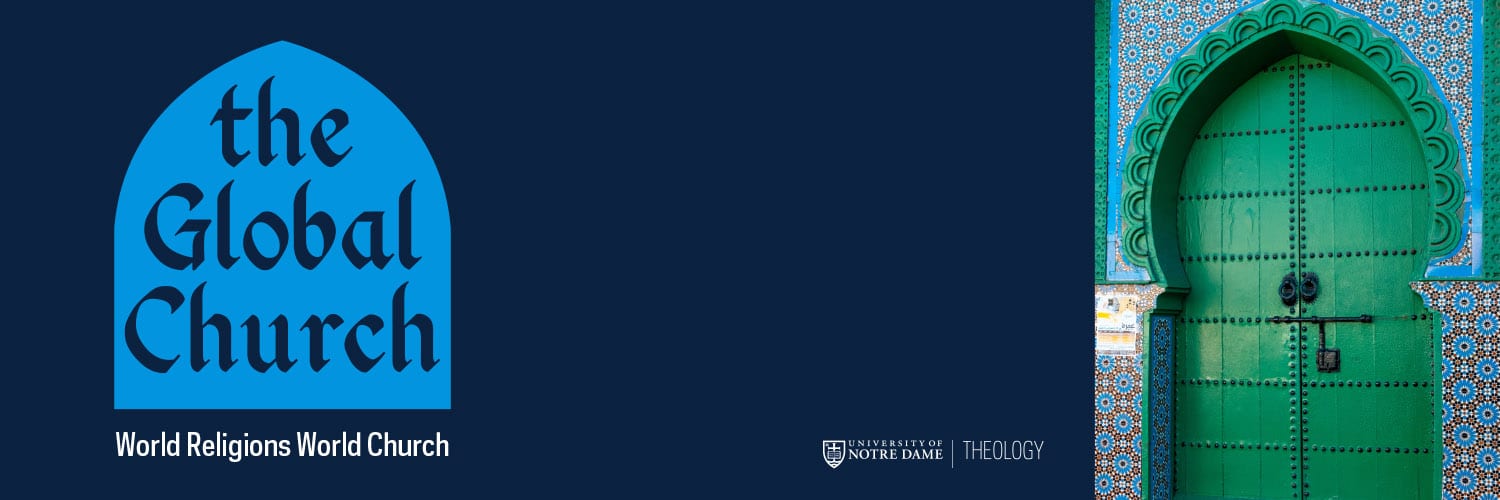The Bible, the Qur'an and the religious life of Muslims

To Muslims, the Qur’an is the record of God’s revelations to Muhammad between 610 and 632 AD. It includes many Biblical characters, from Adam to Jesus to Mary. How does the Qur’an’s view of divine revelation and the relationship between God and humanity relate to that of the Bible? Discover this and more in week one of our course!
Meet the Faculty
Presented by Gabriel Reynolds
Gabriel Said Reynolds is the Crowley Professor of Islamic Studies and Theology at Notre Dame. He is the author of the Qur’an and the Bible and Allah: God in the Qur’an.

Gabriel Said Reynolds did his doctoral work at Yale University in Islamic Studies. Currently he researches the Qur’ān and Muslim/Christian relations and is Professor of Islamic Studies and Theology in the Department of Theology at Notre Dame. He is the author of The Qur’ān and Its Biblical Subtext (Routledge 2010) and The Emergence of Islam (Fortress, 2012), the translator of ʿAbd al-Jabbar’s Critique of Christian Origins (BYU 2008), and editor of The Qur’ān in Its Historical Context (Routledge 2008) and New Perspectives on the Qur’ān: The Qur’ān in Its Historical Context 2 (Routledge 2011). In 2012-13 Prof. Reynolds directed, along with Mehdi Azaiez, “The Qurʾān Seminar,” a year-long collaborative project dedicated to encouraging dialogue among scholars of the Qurʾān, the acts of which appeared as The Qurʾān Seminar Commentary (De Gruyter, 2016). At Notre Dame he teaches courses on theology, Muslim/Christian Relations, and Islamic Origins. He is also a regular contributor to Notre Dame’s World Religions World Church podcast: Minding Scripture.
Getting to Know the Qur’an and the Bible
Presented by Gabriel Reynolds
In the opening video, Professor Reynolds offers an introduction to the Qur’an, the scripture of Islam, and the Qur’an’s interest in the characters and themes of the Bible.
Letter for Week 1
Presented by Gabriel Reynolds
The last two verses of Chapter, or Sura, 85 of the Qur’an relate:
21. In fact, it is a Glorious Quran.
22. In a Preserved Tablet.

This passage helps form the foundation of a common Muslim belief that the Qur’an is more than an inspired book. Instead it is an eternal, heavenly book, brought down from a “preserved tablet.” This notion of the Qur’an as a heavenly book is a good starting point for a comparative study of Islam and Christianity more generally, the task before us over the next three weeks in our course “The Church and Islam.”
Muslims believe that God spoke to prophets throughout history, beginning with Adam and including Jesus (and other major Biblical figures such as Noah, Abraham, and Moses). However, there was one more prophet to come after Jesus: Muhammad. Between the years AD 610 and 632, in the Arabian cities of Mecca and Medina, Muhammad proclaimed the Qur’an: a collection messages that he understood to be the very words of God given to him by the angel Gabriel.

In week 1 of our Church and Islam course, we will discover that the Qur’an does not break radically from Jewish and Christian tradition. Instead, it features Biblical characters and retells Biblical stories. In addition to watching the videos below, you might learn more about this theme through this article, and this episode of the Notre Dame podcast Minding Scripture. From an academic perspective, the Qur’an offers an interesting vision of the religious world of the late antique Middle East, where Christians and Jews were advancing claims about God and scripture. The Qur’an is a new voice to this debate and advances its own claims.
Thinking Theologically about the Qur’an and the Bible
Presented by Gabriel Reynolds
What is the vision of divine revelation in Islam and Christianity? In this video, Professor Reynolds explains why the Qur’an is better compared to Christ, who is the Word of God, than to the Bible.
Moses and “Faith over Family” in the Qur’an
Presented by Gabriel Reynolds
Moses is an important figure in both the Bible and the Qur’an (which names Moses more than any other character). In this video, Professor Reynolds describes why in the Qur’an he becomes the adopted son of Pharaoh and what this says about the Qur’an’s religious worldview.
View the Event
Presented by Gabriel Reynolds
Subscribe to the ThinkND podcast on Apple, Spotify, or Google.
Featured Speakers:
- Gabriel Said Reynolds, Jerome J. Crowley and Rosaleen G. Crowley Professor of Islamic Studies and Theology, University of Notre Dame; Author of Qur’an and the Bible and Allah: God in the Qur’an
- John Shinkwin, Graduate Student in Theology, University of Notre Dame
Additional Resources
Presented by Gabriel Reynolds
- First Things Article for further reading: Reading the Qur’an through the Bible by Gabriel Reynolds
- The Qur’an and the Bible by Gabriel Reynolds
- Minding Scripture podcast: Episode 5: Moses
Prepare for Next Week
Presented by Gabriel Reynolds
Watch the videos before the live discussion in week 2.
